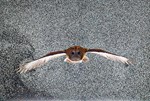Search - News & Events
391 - 400 of 846 results
-
Pioneering Hypophysectomy Treatment Reaches 100-Case Milestone
A cat called Rusty has become the 100th patient to be treated by hypophysectomy at The Royal Veterinary CollegeThe UK’s first successful feline hypophysectomy surgery was performed at the RVC in 2012, to treat …
-
New research confirms extreme welfare issues in Shar Pei, the sandpaper skin dog breed
New research from the Royal Veterinary College (RVC) has found that in-turned eyelids and ear disorders are the most common health conditions in Shar Pei dogs in the UK; both resulting from the breed’s characteristic loose, thickened and folded skin. … -
Kissing and petting young camels found to be key transmitter of Middle East Respiratory Syndrome Coronavirus
New research led by the Royal Veterinary College (RVC) into the spread of MERS-CoV, the virus carried by camels which causes Middle East Respiratory Syndrome (MERS), has found that young camels present a high risk for human exposure to the virus, …New research led by the Royal Veterinary College (RVC) into the spread of MERS-CoV, the virus …
-
New research from the RVC reveals reasons for antibiotic usage in Indian chicken farming
New research from the Royal Veterinary College (RVC), in collaboration with the West Bengal University of Animal & Fishery Sciences (WBUAFS), explored antibiotic use in chicken farming in eastern India, revealing how poultry companies play a …New research from the Royal Veterinary College (RVC), in collaboration with the West Bengal …
-
New research highlights surprisingly good health characteristics in Shih Tzu dogs in the UK
New research from the Royal Veterinary College (RVC) has found the most common conditions diagnosed in Shih Tzu dogs in the UK are periodontal disease (inflammation of the gums and tissue around the teeth), anal sac impaction and ear disorders. … -
Rare sea turtle gets CT scan at the RVC
“Turtley” terrific teamwork at the Royal Veterinary College gives promising CT scan result for Menai the TurtleClinicians at the Royal Veterinary College in Hertfordshire played a key role in a rare turtle’s …
-
World first, RVC finds cognitive impairments in dogs with epilepsy
A series of pioneering research studies from the Royal Veterinary College (RVC) into dogs with epilepsy have revealed that: Dogs with epilepsy find it harder to obey commands, are slower to learn new tricks, have spatial memory deficits and are easily distracted. Aversive training methods, such as bark-activated collars, prong collars and verbal punishment are associated with poor trainability and their use should be avoided. Some anti-epileptic drugs (the medications commonly used to treat seizures) were found to worsen the cognitive impairment of dogs with epilepsy. Dogs with greater exposure to training activities, including obedience classes, agility, and gun-dog training, were found to be associated with higher trainability and have fewer signs of cognitive dysfunction.You can’t teach epileptic dogs new tricks? A series of pioneering research studies from the Royal …
-
Birds in flight share lessons for future aircraft designs
There is much still to learn from birds in flight when developing small and more efficient aircraft, a team of scientists at the RVC has concluded -
The Royal Veterinary College scores top marks for its Sutton Trust Summer School
Results from the Sutton Trust’s recent UK Summer Schools University Comparison Report have highlighted impressive results from The Royal Veterinary College’s (RVC) Summer School. -
Study reveals flat-faced dogs really are less healthy than other dogs
We now have the answer to that burning question about whether flat-faced dogs truly are less healthy overall










